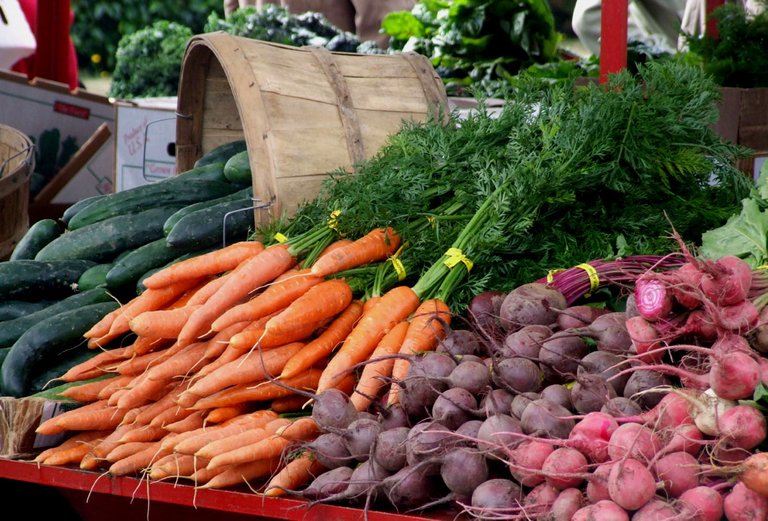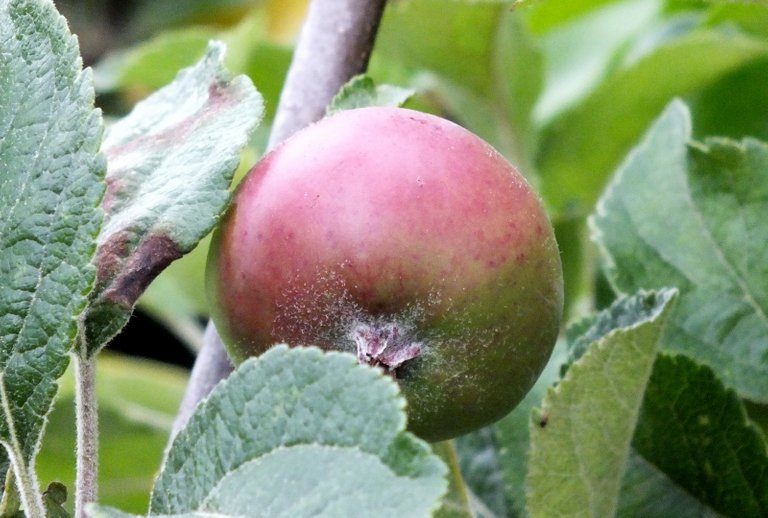Dollar Stores, Food Waste and Ugly Produce
The other day, I accidentally came across an article talking about how certain US cities are starting to ban — or put limitations on — so-called "Dollar Stores" which tend to open up and serve less affluent neighborhoods in mid-sized to larger metropolitan areas.
In case you are not familiar with them, "dollar stores" literally are low-priced variety stores that sell anything from socks to food. We used to have a "Family Dollar" store here in our town some years back, but it closed down some ten years ago. We also had a "99-cent Store" that went away when its parent company went bankrupt.

Produce at our local farmer's market
A lot of the criticism of these types of chain stores is that they basically sell "cheap crap," and there's no arguing against that... they do. But they also serve a demographic by giving them access to products they simply wouldn't be able to afford — period — were it not for these stores.
The whole hullabaloo in these cities specifically centers around the food items sold at these dollar stores which — given the $1 price point, or "several for $1" — typically are cheap processed pre-packaged foods.
Stated a little differently: Not particularly healthy. However, what becomes a bit of a stretch here — at least to my way of thinking — is banning these stores, alleging they are the cause of poor people's bad eating habits.
Critics of the stores seem to think that the poor will start eating healthier foods if they simply don't have access to the crappy ones. Which is faulty logic: Poor people are poor, so they can't afford healthier foods.

This apple is probably too hairy...
Which got me to thinking about the growing controversy over a cluster of recent companies marketing "ugly produce."
When you go into your Safeway or other supermarket chain, you'll typically notice that the fruits and veggies tend to be quite large, uniform in size and very pretty to the point of perfection. Having been part of households with kitchen gardens for many decades, we all know that produce ain't perfect! There are little ones, and spotted ones, and gnarly ones, and odd-shaped ones...
So these companies set up shop selling "ugly" produce at prices generally below what regular produce costs at the supermarket, with part of their sales pitch being that they are addressing the great "food waste" issue we have in the US of A.
Now, I grew up in Denmark, Spain, France and the UK (among others) and we had all sorts of produce there... so this is more of a US-based issue. And I will admit that one of the first things I noticed about going to the supermarket in the US when I first arrived here in my college days (1981) was that the fruit and veggies were all HUGE and very PERFECT compared to what I was used to... and they were also pretty flavorless. But that last bit is a whole other story.

A less-than-perfect berry on the bush...
Of course, the "Ugly Produce" companies are subject to their own set of critics... claiming (mostly) that we don't actually have a "food waste problem" with produce, because it gets plowed under and composted, which isn't waste.
True enough! But once again, they miss the point: The people to whom the fresh — but "ugly" — produce is being sold can't afford to buy the same "normal" produce at 50% higher prices.
Here in our very "organic" and "green" small city, I find myself often taken to task over the fact that I am not "shopping organic," but the simple reality is that I will find myself at the market, trying to make a choice between a dozen "factory farm" eggs for $1.19 and a dozen "fresh organic cage-free" eggs for $4.99. Or a 10lb bag of "from somewhere" potatoes for $2.99 or the locally grown organic potatoes for $1.49 a pound.
Out of Touch?
As I contemplate these realities, it always strikes me as patently obvious that we are not really dealing with a "food waste issue" here OR "the eating habits of the poor"... we're dealing with a socio-demographic economic issue.
Let's face it, I would totally buy fresh organic foods all the time, if I could afford to. But I can't. Although we are increasingly addressing the issue by growing our own.
Bottom line: it's very easy to be high and mighty and self-righteous and judgmental from behind the safe walls of a $90,000/year salary; it's quite another to feed your family on 375 monthly dollars worth of food stamps and whatever else you can spare from your $11.50 an hour job... after you've paid the rent, the bus fares, the electric bill, the phone bill and so on.
Perhaps these critics should all have to live for three months on my food budget before they get to make these sweeping generalizations... and only then do they get to make their assertions!
Thanks for reading!
(Another #creativecoin creative non-fiction post)
What do YOU think? Are the critics of societal issues often sharing their opinions from OUTSIDE the demographic experiencing the issue? Comments, feedback and other interaction is invited and welcomed! Because — after all — SOCIAL content is about interacting, right? Leave a comment-- share your experiences-- be part of the conversation!

(As usual, all text and images by the author, unless otherwise credited. This is original content, created expressly for this platform.)
Created at 20200201 18:43 PST
1183
To listen to the audio version of this article click on the play image.

Brought to you by @tts. If you find it useful please consider upvoting this reply.
Very thought provoking Post as usual ;)
I think people do what they can do to get by and survive. The critics are no doubt people who have never really experienced poverty or a strict budget.
Some of these Dollar stores like "Dollar Tree" do actually have some quality products though. I shop there often.
Thank you @robertandrew! Another favorite of mine is "Big Lots." It's not exactly a dollar store, but they have some really awesome stuff sometimes, and for very low prices. Unfortunately, the nearest one to where we live now is about 50 miles, so we don't use it very often.